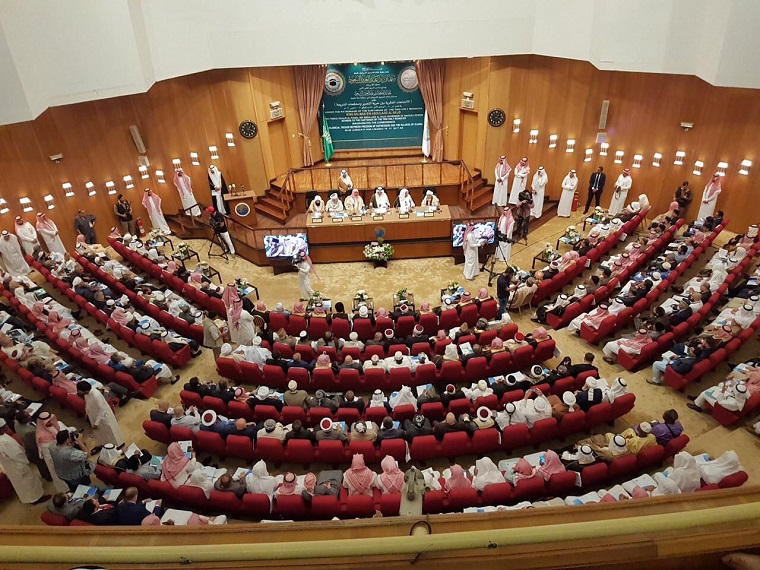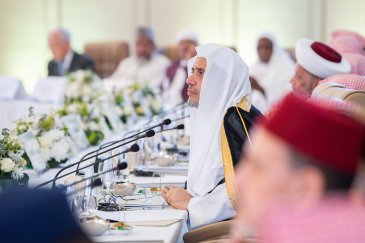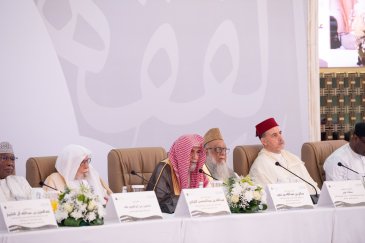The Grand Declaration of the World Conference Intellectual Trends between Freedom of Expression and Laws of Sharia

In the name of God the Most Merciful
The Grand Declaration of the World Conference
Intellectual Trends between Freedom of Expression and Laws of Sharia
Praise be to God, prayers and peace be upon whom there is no prophet after, Prophet Muhammad and his decedents and companions:
Under the patronage of the Custodian of the Two Holy Mosques, King Salman Bin Abdul Aziz Al Saud of Saudi Arabia, the Islamic World League, represented by its Islamic doctrine groups, organized a global conference entitled: "Intellectual Trends between Freedom of Expression and Laws of Sharia". The conference was held at the headquarters of the General Secretariat in the city of Makkah, from the 19th to the 21st March 2017, with a massive attendance of leading Islamic scholars, thinkers and advocates.
On behalf of the Custodian of the Two Holy Mosques, the conference opening ceremony was held by His Royal Highness Prince Khalid Al Faisal Bin Abdul Aziz Al Saud, Advisor to the Custodian of the Two Holy Mosques and Prince of Makkah Region. His Royal Highness delivered a speech on behalf of the Custodian of the Two Holy Mosques, Which welcomed guests of the conference, leading scholars and intellectuals, and expressed a promising feature in the theme of the conference. All attendees considered the speech a valued and official declaration from the King.
During the opening session, a speech was presented by His Excellency Sheikh Abdul Aziz bin Abdullah Al-Sheikh, Grand Mufti of the Kingdom of Saudi Arabia, Chairman of the Supreme Council of Scientists, Chairman of the Supreme Council of the Muslim World League, Chairman of the Islamic Doctrine Academy.
After that, speeches were presented by HE the Secretary General of the Association, Chairman of the Board of Directors of the World League of Muslim Scholars, Vice President of the Islamic Doctrine Academy, Sheikh Dr. Mohammed bin Abdul-Karim Al-Issa, and the Secretary General of the Islamic Doctrine Academy Sheikh Dr. Saleh bin Zaben Marzouki. Dr. Mohammed Kormaz also delivered the speech of the participating government agencies from the Islamic world. In addition His Excellency Sheikh Abdullah bin Sheikh Al-Mahfouz Bin Beih, President of the Forum for the Promotion of Peace in Muslim Societies, delivered the speech for the Islamic civil institutions and institutions participating in the conference.
Participants of the conference discussed scientific and theoretical research presented and proposed the following decisions:
- The General Secretariat of the Islamic Doctrine Group for the Islamic World League shall prepare a project entitled "Rules and Sharia Laws in Contemporary Intellectual Trends". It shall be presented to the next session of the Assembly, after the Assembly has adopted rules and regulations to call for compliance by the various Islamic parties.
- To invite governmental and non-governmental bodies and institutions in the Islamic world to establish the highest values in Islam that call for love, righteousness, tolerance, coexistence and harmony, and to prevent the causes of conflict, division and hatred, including the understanding of the Creator's grace in diversity and pluralism. And to invite Islamic schools of thought to expand their intellectual and scientific capacity, as it shows the amplitude and divine grace of Islam.
- To call on Muslims to respect the religion and co-exist by its course, and to commit to Islamic manners and the high level of dialogue with scientific and intellectual reason. Also to caution against disrespecting followers of Islamic doctrines and causing conflict between religious sects, which is recommended to be illegal under the court of law.
- To demand from officials to address media channels that raise the concepts of hatred and contempt and that fuel fundamentalism among Muslims and between Muslims and others, which causes corruption. To also take the proper approach guided by the grace of God and to warn against the dispersion and conflict between Muslims, according to the words of God: "and all hold the rope of God do not divide and mention the grace of God upon you as you were enemies and he joined between your hearts and you became brothers". And to take evidence in the approach of Islam’s righteousness, charity and coexistence between Muslims and others by the words of God: “God does not forbid those who do not fight you in religion and do not bring you out of your homes, justify them And they are equal to you for God loves those who judge equally”.
- To warn against indulging in religious and intellectual categorization, whether for governmental or private institutions or even individuals, this can fuel disruption among Muslims and spark extremism and conflict.
- To demand adherence to the true identity of Muslims and by the peaceful approach that God has defined the religion of peace with “Islam”. Also to warn from using names and other descriptions that would abuse this all inclusive name, and to only use the statement of truth within the origins and branches of the true comprehensive description of Islam.
- To not consider the descriptions of various doctrinal beliefs and different schools of thought about doctrinal laws the same as the original descriptions approved by Islamic scholars in the past. These descriptions are neither an alternative nor a rival to the name of the all inclusive Islam. They do not expand on original descriptions of what is decided in Muslim literature for any tendency, whether political or organizational. In addition, it is not permissible to dispute legitimate authorities, for all should follow their guidance in times of despair as well as prosperity.
- To warn against leniency in labeling with infidelity, heresy, and libertinism, because scholars should seek forgiveness for their brothers and show good faith in them and demonstrate righteousness and advise them with wisdom. To also warn against arrogance and exclusion, as righteousness does not exclude others. Scholars should be critical of their own views and actions before being critical of others. They should know that convictions are not imposed, but should be justified by evidence in the context of peaceful dialogue and the wisdom of guidance of our Prophet Muhammad peace be upon him as God Almighty said: “It is by of grace from God that you were gentle with them. Had you been harsh, hardhearted, they would have dispersed from around you”.
- To formally request Muslim communities in non-Muslim countries to respect the constitutions, laws and culture of the countries in which they live, and to completely abide in accordance with the constitutional and legal instruments available. Those who do not have the capacity to do so should leave without disrupting order or harming the general conscience.
- To invite Muslim and non-Muslim institutions in non-Muslim countries to promote respect for the constitutions, laws and culture of the countries in which Muslims live. To show that any defiance or offense to constitutions and laws would harm Islam and alienate and place it under accusation. Islam is innocent of all of this. The activities of Muslim communities should always be transparent and supportive of peace and coexistence, and should always show initiative of good will in the countries they reside. Any humanitarian relief activity should encompass all religions, as God Almighty said in the Almighty said: "and feed food despite the love for it to the poor and orphan and captive" The Prophet (peace and blessings be upon him) said: "In Every living liver there is charity". Muslims must be careful regarding negative labeling and classifying others, whether by religion, sect or race. Because Islam has showed throughout its long history that it was only spread and accepted through mercy and compassion, by which God had sent our Prophet Muhammad peace be upon him, and where God says: "We sent you only mercy to the worlds."
- To call upon authorities, institutions, Islamic centers, civil and governmental institutions to educate Muslim youth about the danger of extremist ideas and to address the negative messages transmitted by terrorist in the media, especially through social networking sites.
- To emphasize that it is not in the doctrines and schools of Islam or in its originals or branches any call or reason for extremism and terrorism. As a testament, these intellectual delinquencies were historically fought without exception, as their campaigns were always outside the seriousness of Islam and Muslims. There is no religion at its origin that is extreme, and no religion devoid of extremists, and human history has dealt with chapters of these facts, for no religion, time or place was safe from extremism and it is apparent from time to time. However, contemporary terrorism has shown that it is independent in its criminal atrocities. This is because of many reasons, some of which are the following:
- A lack of role models and having a weak role.
- The growing so-called awakening of young Muslims in respect to their weak awareness, and the isolation from reliable scientific references.
- Igniting the religious passion in youth circles by some preachers outside of the correct and legitimate political dimensions and outside the realistic reading of events. In addition to the absence of true measurement of results and consequences, as well as serious incapacity in reasoning and logical coherence of facts.
- The negative provocation of religious feelings against others with different religion, doctrine or thought.
- The absence of the jurisprudence of tolerance and coexistence.
- The absence of jurisprudence of assimilation and containment.
- The negative declarations in dealing with the violators.
- Ignoring some family, educational and counseling platforms of influence the dangers of wrong collective formulation of thought and feelings. Also the weakness of educational material that can motivate free and independent thinking away from the method of blind indoctrination, which is the reason for lack of awareness.
- Ignorance toward the rules of Islamic law in the order between righteousness and corruption.
- The spread of the phenomenon of Islamophobia in some non-Muslim countries, and its use in politics and media as one of the most serious reasons for stirring up religious emotion to show the side of violent extremism, and in some times, it shows parallel intellectual terrorism.
- Ignoring the Islamic specificities that are consistent with the general rules of constitutions and civilized laws and values that promote tolerance, co-existence and respect for human rights and freedom in some non-Muslim countries. This is due to the growing role of extremist party trends calling for overcoming positive national integration and peaceful coexistence. Whether these extremists are Muslim or not, they merge in identity to spread hatred.
- Writings, speeches, appeals and statements issued by so called advocates of knowledge and science, to mislead the Islamic sense of decision toward global events or incidents away from the peaceful wisdom and empathy of Islam to rationalize and explain different point of views. This is considered one of the most dangerous tools to manufacture extremism that lead to continued rings of violence and terrorism.
- The search for self, falling into the vanity of arrogance, pride and self-deception.
- Psychological and social conditions that bring down dangerous effects on religion.
- Ambiguity of Islamic concepts, and not addressing them with a clear and coherent Islamic statement. This especially dangerous in the meaning of jihad, governance, ignorance, the concept of the state, the House of Islam and the House of War, and others. The Islamic Doctrine Academy and the Muslim World League should take initiative to address this matter.
- Giving high considerations to the intellectual confrontation with the threat of terrorism does not resolve the battle. The terrorist entity is a broad virtual world with no limited geographical scope. Many of its criminal operations are financed by cheap and easily accessible funds. But what helps to control its funding sources is to monitor remittances, while reducing traditional financial exchange through modern exchange and banking alternatives.
With God speed, and peace be upon Prophet Mohammed and his decedents and companions.
Issued in Makkah on 22 Jumada II in 1438 AH, March 21, 2017
| Attachment | Size |
|---|---|
| Download final statement of the conference (6.39 MB) | 6.39 MB |





